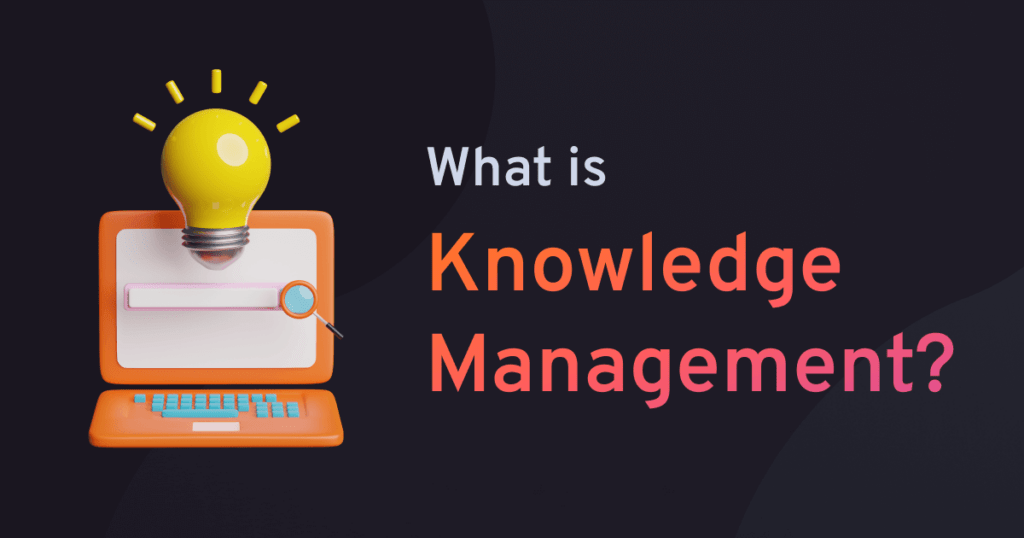Knowledge Management: Benefits and Strategies
In an age where information is as valuable as currency, the concept of knowledge management has emerged as a critical organizational process.
But, what is knowledge management? It’s a strategic approach that involves a range of practices used to identify, organize, store, and share knowledge and information within an organization.
The objective of this multifaceted discipline is not only to create knowledge repositories but also to improve efficiency, facilitate decision-making, and foster a collaborative corporate culture.

Table of Contents
- What is Knowledge Management?
- Knowledge Management for Competitive Advantage
- Types of Knowledge Management
- How a Knowledge Management System Helps
- Benefits of a Knowledge Management System
- What Does Knowledge Management Do?
- Why is Knowledge Management Important?
- Knowledge Management Process and Tools
- Knowledge Management Strategies for Acceleration
- Knowledge Management Use Cases
- Conclusion
- Additional Resources
Leveraging Knowledge Management for Sustainable Competitive Advantage
At its core, the knowledge management framework also enables businesses to capitalize on the collective expertise embedded within their structure. By embracing this approach, enterprises can prevent the painstaking task of reinventing the wheel for every new project or decision.
Moreover, it allows for the retention and growth of intellectual assets, irrespective of individual employee turnover—securing a sustainable competitive advantage in the ever-evolving marketplace.

The Types of Knowledge Management
Understanding the spectrum of knowledge within an organization is essential for an effective knowledge management system (KMS). These layers consist of various types of knowledge, each playing a distinct role in the accumulation and distribution of an organization’s intellectual assets. Diving into these types of knowledge—tacit, implicit, and explicit—reveals the depth and complexity of what is captured, shared, and utilized within an organization.
1- Tacit Knowledge
Tacit knowledge represents the unspoken, intuitive expertise that individuals develop through personal experience and context. This type of knowledge often encompasses skills that are difficult to communicate but are inherent in everyday actions and problem-solving techniques.
Examples of tacit knowledge include personal insights, innovative approaches, sharing knowledge, and the instinctive ability to manage complex situations.
2- Implicit Knowledge
Implicit knowledge sits in the transition zone between the hard-to-articulate tacit knowledge and the readily documented explicit knowledge.
While it stems from personal understanding, implicit knowledge is more about methodologies and processes that have been internalized but not yet standardized or codified within an organization’s formal documentation.
3- Explicit Knowledge
Explicit knowledge is the most accessible layer, consisting of information that has been formally articulated, documented, and organized. This can include policy manuals, databases, instructional materials, and more.
Because of its structured nature, explicit knowledge serves as the backbone for successful knowledge management, transfer, and preservation strategies in KMS.
How a Knowledge Management System Helps Organizations
Implementing an efficient KMS can be transformative for any organization, leveraging the benefits of knowledge management solutions to elevate performance and competitiveness.
Guided by best practices such as those in ITIL knowledge management, these systems are not merely repositories of information but dynamic tools that enhance every aspect of a company’s operations.
Benefits of a Knowledge Management System
Empirical evidence points to a direct correlation between the use of a KMS and the numerous benefits an organization can reap. Among these benefits, knowledge management contributes to a reduction in redundant work, acceleration of research and development, better communication between departments and personnel, and notably, enhanced ticket deflection.
In addition, By integrating Search as a Service into their KMS, organizations can achieve a more dynamic, efficient, and effective knowledge management process, leading to substantial improvements in operational efficiency and decision-making.
Adopting a robust KMS results in a cohesive structure where knowledge is curated and disseminated efficiently, leading to an empowered workforce well-equipped with the right information at the right time.
Other key benefits include:
- Streamlined Decision-Making Processes
- Retention of Institutional Knowledge
- Identification and Bridging of Skill Gaps
- Efficient Onboarding and Training
- Fostering Innovation and Collaboration
- Enhancing Data Security and Compliance
Will Knowledge Management Improve Work Performance?
The influence of a knowledge management system on work performance cannot be overstated. By providing instant access to vital data and insights, employees can bypass the often time-consuming process of retrieving information from siloed sources.
Such expedited access to the knowledge management practices allows for more informed decision-making and aligns perfectly with ITIL knowledge management protocols, known for improving service management and productivity in the IT sector and beyond.
|
Key Performance Indicator |
Without KMS |
With KMS |
| Time Spent on Information Retrieval | High | Reduced Significantly |
| Rate of Employee Collaboration | Low | High |
| Incidence of Redundant Tasks | Common | Rare |
| Speed of Onboarding New Employees | Slow | Accelerated |
| Compliance and Data Security Measures | Variable | Stringent |
What Knowledge Management Systems Do?
A knowledge manager serves as the architect of an organization’s intellectual framework—a role that demands a blend of strategic vision and pragmatic execution. At the core of their responsibilities lies the development of knowledge management processes and strategies that enable a seamless flow of information, strengthening the company’s foundation for informed decision-making and innovation.
Tasked with forming the conduits through which knowledge travels, a company knowledge manager ensures that every team member can access the insights they need to excel in their roles. This involves curating repositories of data, documents, and expertise that encapsulate the company’s cumulative wisdom.
Below is a breakdown of critical functions a knowledge manager typically performs to maintain the vitality of an organization’s knowledge base:
- Designing and implementing knowledge repositories, such as databases and wikis.
- Crafting guidelines and protocols for consistent knowledge documentation and retrieval.
- Conducting training sessions that promote best practices in knowledge sharing.
- Monitoring the effectiveness and knowledge management strategy as needed.
- Encouraging a company-wide culture of continuous learning and open communication.
Through their meticulous curation and oversight, knowledge managers not only guard against knowledge attrition due to employee turnover but also pave the way for agile adaptation to changing business landscapes. They function as the guardians of institutional knowledge and the catalysts for a perpetually learning organization.

Why is Knowledge Management Important?
The organizational ecosystem thrives when the knowledge management process is given the credence it deserves. Recognizing the importance of knowledge management enables companies to harness the collective intellect of their workforce, turning information into an actionable asset.
Sustaining a competitive edge in today’s market is often a direct result of prioritizing this core business strategy. At the crux of knowledge management’s importance is its formidable impact on productivity and innovation.
An intelligent approach to managing knowledge resources boosts the speed and quality of project execution, ensuring businesses stay agile and responsive to market changes.
- Cultivation of a learning culture that promotes continuous professional development
- Optimization of operational workflows through shared learnings and best practices
- Protection of intellectual property and mitigation of knowledge loss due to attrition
Appreciating the substantial role of the knowledge management team cultivates an environment where information sharing becomes the norm, rather than the exception.
This culture shift is imperative for organizations that wish to foster inventive thinking and expedite the decision-making process.
|
Knowledge Management Benefits |
Real-World Impact |
| Streamlined information dissemination | Minimized search times and accelerated project completion |
| Enhanced decision-making capabilities | Improved strategic initiatives based on reliable data |
| Conservation of institutional knowledge | Continuous access to historical data and expertise |
| Adaptation to market trends and shifts | Agility in responding to new business opportunities |
Indeed, a good knowledge management system is not an optional adjunct but an essential tenet of modern organizational strategy. It encapsulates the importance of not only capturing knowledge but also ensuring its flow and accessibility, thereby empowering teams and buttressing the organization’s knowledge capital.
Knowledge Management Process and Tools
A harmonized knowledge management process is pivotal for organizations to not only manage but also maximize the utility of their intellectual assets. The stages of this process, encompassing acquisition, knowledge creation, refinement, storage, transfer, sharing, and utilization, are actualized through a portfolio of robust tools.
Integrating these tools into the IT Service Management (ITSM) framework magnifies their impact, underpinning ITSM knowledge management endeavors.
Knowledge Management Tools
To actualize the knowledge management process, various specialized tools and platforms are employed. These range from document management systems that centralize organizational documents for easy retrieval and archival to content management systems (CMS) that streamline the creation and management of digital content.
The utility of these implemented knowledge management tools is multifaceted, cutting across different knowledge management needs.
|
Tool Category |
Function |
Impact on Knowledge Management Process |
| Document Management Systems | Storage and retrieval of digital documents | Ensures secure, version-controlled storage of explicit knowledge |
| Content Management Systems (CMS) | Management of web content creation | Facilitates decentralized authoring and collaborative content creation |
| Intranets | Internal company communication networks | Serves as a central hub for sharing information and social knowledge |
| Wikis | Collaborative knowledge bases | Allows collective refinement and expansion of organizational knowledge |
| Data Warehouses | Consolidation of business data | Supports data-driven decision-making and business intelligence activities |
These tools, when wielded effectively, empower organizations to handle the inherent complexity of managing knowledge.
They become linchpins in the infrastructure supporting a data-inclusive culture wherein decision-making is agile and deeply informed, epitomizing the core virtues of the knowledge management process and tools.
Knowledge Management Strategies for Acceleration
Operational excellence in today’s information-driven economy necessitates robust knowledge management. Enterprises that innovate in their knowledge dissemination practices can yield significant competitive advantages. Below are strategies pivotal for enhancing knowledge management within an organization:
A vibrant network of interconnected gears representing the collaboration between employees and departments in knowledge sharing and transfer.
- Encourage Knowledge Sharing: Establish incentive programs that recognize and reward contributions to knowledge repositories. This can motivate team members to engage in behavior that supports knowledge continuity.
- Develop Communities of Practice: These are groups of people who share a common concern or passion for something they do. Organizing such communities facilitates the informal transfer of tacit knowledge.
- Cultivate a Culture of Trust: Create an environment where employees feel secure in sharing insights and innovations, knowing that their contributions are valued and protected.
- Leverage Expertise: Promote subject matter experts as ambassadors to fast-track knowledge transfer and mentorship within the organization.
- Implement Robust Platforms: Invest in knowledge management systems that are user-friendly, accessible, and integrate seamlessly with current workflows to ensure high adoption rates.
By embracing these strategies to accelerate knowledge management, organizations can augment their ability to navigate complex challenges, maximize organizational learning, and maintain a more informed, agile, and collaborative workforce.
Knowledge Management Use Cases
Knowledge Management plays a crucial role across various scenarios within the corporate landscape, from onboarding new team members to enhancing the day-to-day operational tasks of established staff. It proves indispensable in providing customer service solutions that favor self-help methods.
The deployment of a modern knowledge management system with resources tailored for ongoing education, cross-referencing critical information, and tools for problem-solving, establishes a platform for a workforce that is well-informed and primed for efficiency. These practical applications are emblematic of the indispensable role knowledge management holds in a thriving business environment.
Conclusion
Knowledge retrieval is vital in modern enterprises, offering a strategic edge by converting information into valuable actionable insights. Integrating Aisera’s Enterprise AI Search supercharges this process, providing precise, personalized search results with advanced AI capabilities.
It streamlines information retrieval, ensuring secure, relevant, and up-to-date responses, thereby boosting productivity and maintaining competitive agility in a fast-paced business world. Book a free AI demo today!
